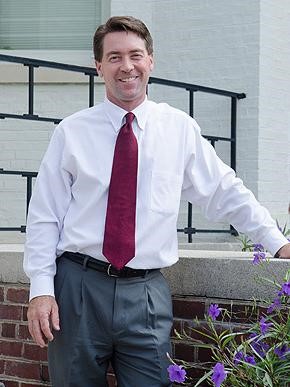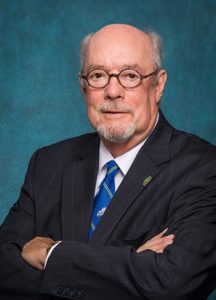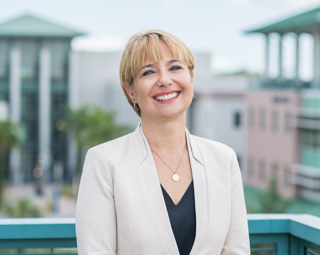Mark Rieger, Ph.D., a celebrated dean and professor at the University of Delaware, is Florida Gulf Coast University’s (FGCU) next executive vice president and provost. Rieger accepted the position last week after a nationwide search that took more than a year, delayed due to the COVID-19 pandemic. The new provost will succeed Jim Llorens, Ph.D., who completes his interim appointment in December, but will assist during the spring transition period.

“Mark Rieger has a very strong background at some major universities that I think will help us in many ways, but not the least of which is to raise our productivity in research and scholarship,” said FGCU President Mike Martin, Ph.D.
To know Rieger is to understand a 160-year-old law, known as the Morrill Act. Signed by Abraham Lincoln in July 1862, the legislation aimed “to promote the liberal and practical education of the industrial classes in the several pursuits and professions in life.” The act saw the federal government provide land to the states to sell and create revenue to build public higher education institutions, known as “land grant” universities or colleges. These universities educated the people needed to build the country. Many major schools were created because of the Morrill Act, including the University of Florida, the University of Georgia and the University of Delaware – all places where incoming Provost Rieger earned tenure.
“I’m not really leaving the last 30 years of higher education philosophy behind; I just see regional institutions, Florida Gulf Coast University, in particular, executing the Morrill Act philosophy more nimbly and efficiently than some of the large land grants are today. That’s one of the things that attracted me to FGCU,” Rieger said. “If we’re not relevant and impactful, if we’re not creating the workforce that’s going to help the region and the state be successful, why are we taking money from Tallahassee? You’ve got to give more if you’re going to be publicly supported and valued in the community. I’m all about those basic philosophies that drive what we do.”
Martin noted Rieger’s experience with the University of Florida’s honors program, which gives the president confidence that the new provost has a “strong sense of student engagement.” In his cover letter, Rieger expressed his passion for servant leadership. While his primary focus is on serving students, the effort will not work without a similar emphasis on faculty and staff.
“Great faculty and staff, whose talents and dedication are nurtured by university administration, create successful students,” Rieger wrote. “A recent study of 30,000 graduates by Gallup entitled, ‘Great Jobs, Great Lives,’ showed that people were three times more likely to be thriving if they had professors that cared, made them excited about learning, and mentored them to follow their dreams. They were also twice as likely to be engaged at work as graduates who didn’t experience such support in college. The good news for higher ed – it doesn’t cost any more to care about, inspire and empower students while you’re educating them.”
From a career with tenure to one without
One of the areas Rieger is most interested in learning more about is FGCU’s non-tenure employment structure. Unlike other State University System of Florida schools, FGCU’s faculty members work on multiyear contracts without the option to work toward a permanent employment status tenure typically delivers. Nevertheless, Rieger said FGCU’s approach brings opportunities.
“I’ve never needed tenure,” Rieger said. “I was always driven intrinsically to do my very best, to teach students the best I could, to do the best research I could. That, I believe, is true of 80 or 90 percent of people. But you do have people who are just sort of comfortable, so I think we need to think about the reward system. What are we doing to influence behavior so that people want to go above and beyond?”
Ultimately, it comes back to department chairs, Rieger said.
“Department chairs are probably the most important administrators on campus. I firmly believe that,” he said. “I’m not only going to interact with faculty, but I’m going to interact with the chairs a lot. It’s their role, and it’s their responsibility to find and drive the motivation in people.”
The new provost looks to options like short sabbaticals as ways to reinvigorate and inspire faculty.
“I did a three-month sabbatical at Colorado State University in the early ’90s. It completely changed my research trajectory. I became more successful, published in better journals and started getting better grants because of that opportunity. That’s all it takes – a little bit of investment can sometimes change somebody’s life. It can set them in a new direction, field or aspect of what they’re doing.”
He also sees the need to inspire some people who are already full professors. He’s speaking to those who may have maxed out their earning potential. Rieger said he has no qualms with taking a page out of another institution’s playbook. One example he shared focused on competition, granting the reward to 5 percent of those who ultimately win.
“Another institution where I worked provided professors with an opportunity to compete. Interested professors would apply for this special pay plan, which was about an 8- to 9-percent raise. To get it, you had to have a body of work past your last promotion that was over and above what you were doing before. It wouldn’t change your classification, but it gave you something to look forward to and keep you motivated. Some people need that kind of extrinsic motivation, and they will work harder to achieve it,” he said.
While Rieger doesn’t guarantee that’s the model FGCU will adopt, he’s eager to create new opportunities for faculty to be successful and rewarded.
A diverse student body demands a diverse faculty
In the aftermath of George Floyd’s murder, students made many demands of higher education. Locally, President Martin convened a group of people from across campus to discuss challenges and opportunities, including the need for more diversity in hiring. For incoming Provost Rieger, the topic of attracting nonwhite faculty members has presented itself at all three of his previous institutions.

“What we saw in the last six months with a lot of the social justice issues was the message that change is wanted right now. I appreciate that,” Rieger said. “I understand where that comes from, but we need the time to build a pipeline. If we just hire professors of color away from other institutions, we’re not addressing the larger issue – making higher education a desired avenue for the people we seek to attract. If we want more people of color working in academia, we must start at the pipeline.”
While the idea of a hiring pipeline may conjure many thoughts on starting points, Rieger points to the undergraduate level.
“At the University of Delaware, we have programs for rising seniors to do summer research so they then get a taste of what it’s like to get a master’s or a Ph.D. Lo and behold, after offering these opportunities for 10 years, we find a lot of the students who spent just one summer with us went on to get a master’s or a Ph.D. Some of them went on to the professorate,” he said.
Rieger calls the undergraduate mission his “strong suit.” Thus, he believes FGCU’s focus on undergraduate education is the right place, with student success at the forefront, for him to create strong summer programs that ultimately lead to a more diverse faculty.
“So when we have a student who goes on and gets their Ph.D., we need to invite them back for a seminar and offer them a job. We have to get behind the longer-term approaches. We have to spend some money on summer programs, honors programs and senior thesis programs to get students excited about discovery. And when they do, they will likely have that intrinsic motivation that takes them to a Ph.D.”
Beyond creating the pipeline, Rieger said there is something very simple hiring managers can do – pick up the phone.
“Look at the institutions that graduate a high number of nonwhite individuals with Ph.D.s and call them. Ask them who they have that’s graduating because we have a job opening. Very simple phone conversations and recruiting to develop your pool can be effective, but it must start with the pipeline,” Rieger said.
A future filled with micro-credentials
In a couple of instances, Rieger has shared his support for higher education’s trend to create micro-credentials and badges that help prepare students for the local workforce. That effort at FGCU is spearheaded by Aysegul Timur, Ph.D., vice president and vice provost for strategy and program innovation.

“Certificates, digital badges and simple micro-credentials are all about closing skills gaps, especially for core abilities needed by businesses,” Timur said. “In today’s business environment, industries and organizations are moving and changing so fast that their employees need upskilling and reskilling for these abilities at all levels – from entry-level to managerial or supervisory positions.”
The most prominent example of this effort at FGCU is the creation of the medical device industry course in partnership with Arthrex, a global medical device company. This class will familiarize students with the fundamentals of the medical device industry and help them master the skills needed to start a career in that field. Students can either take this course en route to an undergraduate degree or as a standalone class to earn a micro-credential.
Rieger said his support for this effort comes from speaking directly with business leaders in Delaware. While there continues to be support for traditional degrees, certain businesses are looking for faster options.
“A vice president for a local, major company once said to me, ‘Mark, we’re not going to send people to you for two years to get a master’s degree. We’re just not going to do it. But, if you can help deliver, in short format, five key life or professional skills that will help a person advance in their career and be a better employee for us, then I will pay you to do that.’ That caught my attention. When we only provide education in chunks of two or four years, I think we’re missing a whole segment of the population that doesn’t need the entire degree,” Rieger said.
A FOCUS on the future
With roughly two years remaining in its current strategic plan, FOCUS 2017-2021, FGCU has followed a model championed by its new provost. He calls it “selective excellence.” Like other universities with limited resources, Rieger supports the idea that an institution cannot do everything, but everything it tries to do should be done excellently.
Not knowing what the future holds does not limit an institution from being nimble with its planning. The Water School, for example, is not explicitly part of the FGCU strategic plan. Nevertheless, Rieger still sees how it fits.
“The Water School is consistent with the strategic plan, in a way, because it is focused on a relevant and impactful topic for Southwest Florida. What could be more in the strike zone than water issues in Southwest Florida? That’s consistent with selective excellence and FOCUS.”
And the future for Rieger will likely include the conclusion of one FGCU presidency and the beginning of another.
“The goal is to have a senior leader who can span my time and into the next presidency,” said President Martin. “I think Mark can do that.”
It’s a challenge the incoming academic leader thought about and embraced.
“I have confidence,” Rieger said. “I have confidence that I’ll be able to deliver on things early. I’ll be able to build trustworthy relationships among the faculty, chairs, staff and others. All I’m thinking about right now is trying to be the best provost I can be. My faith is in my experience and my God-given talents, and I think that I’ll be fine.”
No matter what the future holds, he plans to “absorb everything he can” from President Martin.
“If I’ve learned anything from working under three presidents and three provosts in the last seven years, it’s to be ready for the change,” Rieger said.